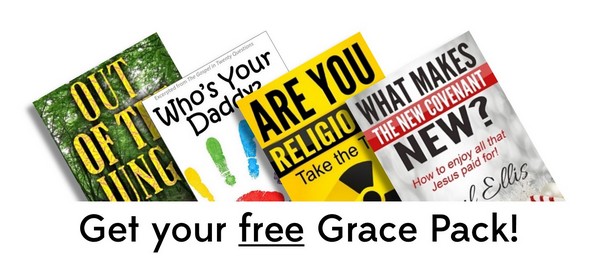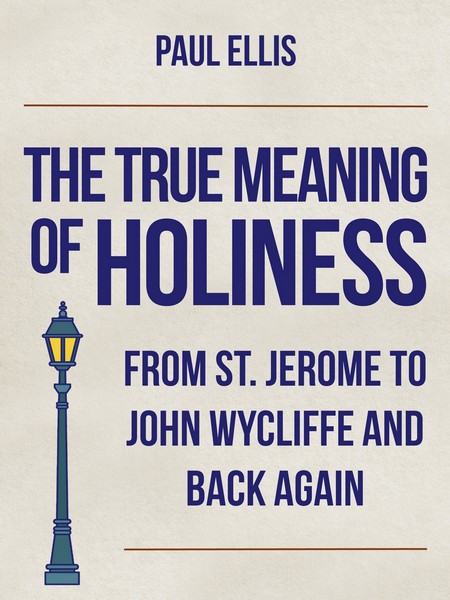
As a teenager, I didn’t need anybody to tell me what to do.
As an adult, I wish somebody would.
Life is big and confusing. It’s full of anxiety, uncertainty, and questions that have no answers. And this is why some people prefer law to grace. They’d rather live under the old covenant than the new.
Back then if you wanted to stay on the straight and narrow, you just had to keep all the rules. But in the kingdom of grace, there are no rules. “All things are lawful” (1 Cor 6:12).
For those unacquainted with the security of God’s love, the absence of rules can be terrifying.
“I wish somebody would just tell me what to do!”
Enter the holiness preachers.
[Insert scary organ music here.]
Much of what passes for holiness preaching today is old covenant theology dressed up in new covenant ribbons. See if you can spot the difference:
Then: God promised we would be his holy people if we kept the rules. The law is a how-to manual for holiness.
Now: Am I saved by the law? Oh, no. That’s so old covenant. But the law shows me how to live pleasing to the Lord.
See the difference? Strip away the mumbo-jumbo and there is no difference!
Read some of the comments I get whenever I write about the commands of the Bible or the law written on our hearts, and you will find 101 different ways of saying the same thing: The Rules are a manual for holy living. The only difference between then and now is that some of the rules have changed.
The Israelites lived by the ceremonial rules of Moses; today, many Christians make up their own rules.
“I just keep the red letters of Jesus.”
“I try to do everything in the Bible.”
“I just do whatever my pastor says.”
D.I.Y. holiness
Practical holiness is a term to beware as it often comes with a fishhook. Much of it is toxic mixture, as the following soundbites illustrate:
- “Following Christ is a lifestyle.” (Okay.) “We’ve got to keep his commands to be his disciples.” (Nope – that’s backwards. That’s putting the fruit before the tree.)
- “Find out what pleases the Lord.” (Yes!) “Keeping his instructions pleases him.” (No, that’s faithless, law-based living that nullifies grace and inflames sin (Rom. 7). Living by faith pleases the Lord. Trust him.)
- “If you sow to the flesh you will reap destruction.” (Yep). “So we have to be earnest in getting people to change their behavior.” (But that’s sowing to the flesh! You’re setting them up for failure.)
Holiness preaching that emphasizes what you must do is carnal Christianity. Make no mistake, it comes straight out of the old covenant. Heed this sort of teaching and you will exalt the flesh at the expense of grace.
And it won’t make you holy.
Here are four ways to determine whether the holiness message you’re listening to reflects the condemning covenant of the law or the new and liberating covenant of grace:
- Old covenant holiness is based on who you are (a bit of a reprobate) and is sold as a list of things you must do; new covenant holiness is based on who Christ is (our holiness – 1 Cor 1:30) and what he has done (sanctified you – Heb 2:11, Rom 11:16).
- Old covenant holiness emphasizes sacrifices you must make; new covenant holiness emphasizes the perfect sacrifice of the Lamb, by which you were “perfected forever” (Heb 10:14).
- Old covenant holiness is sold as a process of increasing sanctification – something “we grow into” as we become more like Christ; new covenant holiness is presented as a done deal (Heb 10:10). Your behavior may need to change, but in Christ you are as holy as he is.
- Old covenant holiness comes with a big stick – “the Lord will condemn you if you don’t deliver”; new covenant holiness has exhortations but no sticks because there is no condemnation to those who are in Christ Jesus (Rom 8:1).
Beware frowners preaching holiness
Because of these differences in message, we can also recognize differences in the messenger. An old covenant holiness preacher is serious and threatening. He will remind you of Moses warning the Israelites at the foot of Mt Sinai.
But a new covenant preacher of holiness is life-giving and inspirational. He will remind you of Jesus speaking the words of life.
An old covenant holiness preacher will speak the faithless language of longing and lack. But a new covenant preacher will bracket any exhortations with affirmations like these:
Finally, brothers, we instructed you how to live in order to please God, as in fact you are living. (1 Thessalonians 4:1).
Now about brotherly love we do not need to write to you, for you yourselves have been taught by God to love each other. And in fact, you do love all the brothers throughout Macedonia. (1 Thessalonians 4:9-10)
How to preach holiness
We need to preach holines same way the apostles did. To be holy is to allow the Lord to express his whole and beautiful life through us.
The challenge is that being holy is a new experience for us. As unbelievers, holiness was totally alien to us. That old lifestyle was characterized by brokenness and hurt.
Now that we are in him we have to learn to walk in our new and God-given identity.
The wrong way to approach this is to think of yourself as a flawed sinner trying to become holy. That’s not who you are and that’s not how it works.
Instead, see yourself as a toddler learning to walk. Just as you wouldn’t smack an infant if they stumbled and fell, neither will your heavenly Father smack you. He doesn’t condemn you when you fall, but he lovingly encourages you to get up and walk.
He has given you everything you need for life and godliness. In Christ you lack nothing. You just need to work out who you already are and what he has already given you.
This is the adventure of holy living.
—
WordPress is changing the way it manages subscriptions. If you have recently signed up as an email subscriber, you might not have received the download links for the Grace Pack. Here they are:









